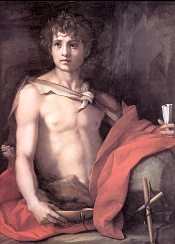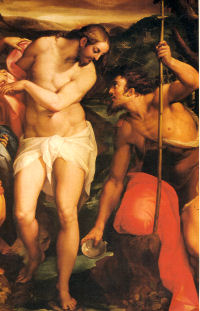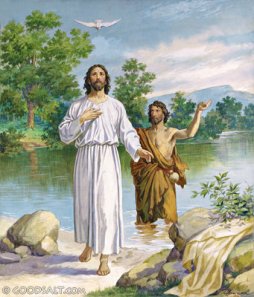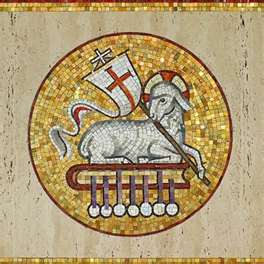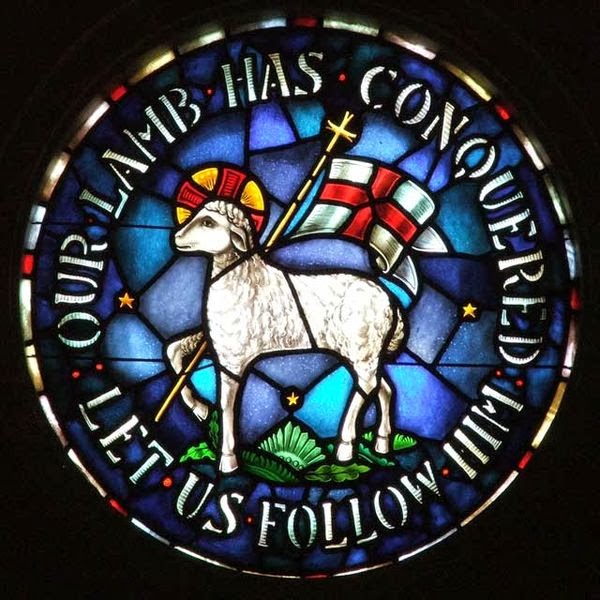29. The next day John sees Jesus coming to him, and said, Behold the Lamb of God, which takes away the sin of the world.
30. This is he of whom I said, After me comes a man which is preferred before me: for he was before me.
31. And I knew him not: but that he should be made manifest to Israel, therefore am I come baptizing with water.
ORIGEN; After this testimony, Jesus is seen coming to John, not only persevering in his confession, but also advanced in goodness: as is intimated by the second day. Wherefore it is said, The next day John sees Jesus coming to him. Long before this, the Mother of Jesus, as soon as she had conceived Him, went to see the mother of John then pregnant; and as soon as the sound of Mary's salutation reached the ears of Elisabeth, John leaped in the womb: but now the Baptist himself after his testimony sees Jesus coming. Men are first prepared by hearing from others, and then see with their own eyes. The example of Mary going to see Elisabeth her interior, and the Son of God going to see the Baptist, should teach us modesty and fervent charity to our inferiors. What place the Savior came from when He came to the Baptist we are not told here; but we find it in Matthew, Then comes Jesus from Galilee to Jordan unto John to be baptized of him.
CHRYS. Or; Matthew relates directly Christ's coming to His baptism, John His coming a second time subsequent to His baptism, as appears from what follows: I saw the Spirit descending, &c. The Evangelists have divided the periods of the history between them; Matthew passing over the part before John's imprisonment, and hastening to that event; John chiefly dwelling on what took place before the imprisonment. Thus he says, The next day John sees Jesus coming to him. But why did He come to him the next day after His baptism? Having been baptized with the multitude, He wished to prevent any from thinking that He came to John for the same reason that others did, viz. to confess His sins, and be washed in the river to repentance.
He comes therefore to give John an opportunity of correcting this mistake; which John accordingly did correct; viz. by those words, Behold the Lamb of God, which takes away the sin of the world. For He Who was so pure, as to be able to absolve other men's sins, evidently could not have come thither for the sake of confessing His own; but only to give John an opportunity of speaking of Him. He came too the next day, that those who had heard the former testimonies of John, might hear them again more plainly; and other besides. For he said, Behold the Lamb of God, signifying that He was the one of old sought after, and reminding them of the prophecy of Isaiah, and of the shadows of the Mosaic law, in order that through the figure he might the easier lead them to the substance.
AUG. If the Lamb of God is innocent, and John is the lamb, must he not be innocent? But all men come of that stock of which David sings sorrowing, Behold, I was conceived in wickedness. He then alone was the Lamb, who was not thus conceived; for He was not conceived in wickedness, nor in sin did His mother bear Him in her womb, Whom a virgin conceived, a virgin brought forth, because that in faith she conceived, and in faith received.
ORIGEN; But whereas five kinds of animals are offered in the temple, three beasts of the field, a calf, a sheep, and a goat; and two fowls of the air, a turtle dove and a pigeon; and of the sheep kind three are introduced, the ram, the ewe, the lamb; of these three he mentions only the lamb; the lamb, as we know, being offered in the daily sacrifice, one in the morning, and one in the evening. But what other daily offering can there be, that can be meant to be offered by a reasonable nature, except the perfect Word, typically called the Lamb?
This sacrifice, which is offered up as soon as the soul begins to be enlightened, shall be accounted as a morning sacrifice, referring to the frequent exercise of the mind in divine things; for the soul cannot continually apply to the highest objects because of its union with an earthly and gross body. By this Word too, Which is Christ the Lamb, we shall be able to reason on many things, and shall in a manner attain to Him in the evening, while engaged with things of the body. But He Who offered the lamb for a sacrifice, was God hid in human form, the great Priest, He who said below, No man takes it (My life) from Me, but I lay it down of Myself: whence this name, the Lamb of God: for He carrying our sorrows, and taking away the sins of the whole world, has undergone death, as it were baptism. For God suffers no fault to pass uncorrected; but punishes it by the sharpest discipline.
THEOPHYL. He is called the Lamb of God, because God the Father accepted His death for our salvation, or, in other words, because He delivered Him up to death for our sakes. For just as we say, This is the offering of such a man, meaning the offering made by him; in the same sense Christ is called the Lamb of God Who gave His Son to die for our salvation. And whereas that typical lamb did not take away any man's sin, this one has taken away the sin of the whole world, rescuing it from the danger it was in from the wrath of God.
Behold Him Who takes away the sin of the world: he said not, who will take, but, Who takes away the sin of the world; as if He were always doing this. For He did not then only take it away when He suffered, but from that time to the present, He takes it away; not by being always crucified, for He made one sacrifice for sins, but by ever washing it by means of that sacrifice.
GREG. But then only will sin be entirely taken away from the human race, when our corruption has been turned to a glorious incorruption. We cannot be free from sin, so long as we are held in the death of the body.
THEOPHYL. Why does he say the sin of the world, not sins? Because he wished to express sin universally: just as we say commonly, that man was cast out of paradise; meaning the whole human race.
GLOSS; Or by the sin of the world is meant original sin, which is common to the whole world: which original sin, as well as the sins of every one individually, Christ by His grace remits.
AUG. For He Who took not sin from our nature, He it is Who takes away our sin. Some say, We take away the sins of men, because we are holy; for if he, who baptizes, is not holy, how can he take away the other's sin, seeing he himself is full of sin? Against these reasoners let us point to the text; Behold Him Who takes away the sin of the world; in order to do away with such presumption in man towards man.
ORIGEN; As there was a connection between the other sacrifices of the law, and the daily sacrifice of the lamb, in the same way the sacrifice of this Lamb has its reflection in the pouring out of the blood of the Martyrs, by whose patience, confession, and zeal for goodness, the machinations of the ungodly are frustrated.
THEOPHYL. John having said above to those who came from the Pharisees, that there stood one among them whom they knew not, he here points Him out to the persons thus ignorant: This is He of whom I said, After me comes a man which is preferred before me. Our Lord is called a man, in reference to His mature age, being thirty years old when He was baptized: or in a spiritual sense, as the Spouse of the Church; in which sense St. Paul speaks, I have espoused you to one husband, that I may present you as a chaste virgin to Christ.
AUG. He comes after me, because he was born after me: He is made before me, because He is preferred to me.
GREG. He explains the reason of this superiority, in what follows: For He was before me; as if his meaning was; And this is the reason of His being superior to me, though born after me, viz. that He is not circumscribed by the time of His nativity. He Who was born of His mother in time, was begotten of His Father out of time.
THEOPHYL. Attend, O Arius. He said not, He was created before me, but He was before me. Let the false sect of Paul of Samosata attend. They will see that He did not derive His original existence from Mary; for if He derived the beginning of His being from the Virgin, how could He have been before His precursor? it being evident that the precursor preceded Christ by six months, according to the human birth.
CHRYS. That He might not seem however to give His testimony from any motive of friendship or kindred, in consequence of his being related to our Lord according to the flesh, he says, I knew Him not. John could not of course know Him, having lived in the desert. And the miraculous events of Christ's childhood, the journey of the Magi, and such like, were now a long time past; John having been quite an infant, when they happened. And throughout the whole of the interval, He had been absolutely unknown: insomuch that John proceeds, But that He should, be made manifest to Israel, therefore am I come baptizing with water. (And hence it is clear that the miracles said to have been performed by Christ in His childhood, are false and fictitious.
For if Jesus had performed miracles at this early age, he would not have been unknown to John, nor would the multitude have wanted a teacher to point Him out.) Christ Himself then did not want baptism; nor was that washing for any other reason, than to give a sign beforehand of faith in Christ. For John said not, in order to change men, and deliver from sin, but, that he should be made manifest in Israel, have I come baptizing. But would it not have been lawful for him to preach, and bring crowds together, without baptizing? Yes: but this was the easier way, for he would not have collected such numbers, had he preached without baptizing.
AUG. Now when our Lord became known, it was unnecessary to prepare a way for Him; for to those who knew Him, He became His own way. And therefore John's baptism did not last long, but only so long as to show our Lord's humility. Our Lord received baptism from a servant, in order to give us such a lesson of humility as might prepare us for receiving the grace of baptism, And that the servant's baptism might not be set before the Lord's, others were baptized with it; who after receiving it, had to receive our Lord's baptism: whereas those who first received our Lord's baptism, did not receive the servant's after.
32. And John bore record, saying, I saw the Spirit descending from heaven like a dove, and it abode upon him.
33. And I knew him not: but he that sent me to baptize with water, the same said unto me, Upon whom you shall see the Spirit descending, and remaining on him, the same is he which baptize with the Holy Ghost.
34. And I saw, and bore record that this is the Son of God.
CHRYS. John having made a declaration, so astonishing to all his hearers, viz. that He, whom he pointed out, did of Himself take away the sins of the world, confirms it by a reference to the Father and the Holy Spirit. For John might be asked, how did you know Him? Wherefore he replies beforehand, by the descent of the Holy Spirit: And John bore record, saying, I saw the Spirit descending from heaven like a dove, and it abode upon him.
AUG. This was not however the first occasion of Christ's receiving the unction of the Holy Spirit: viz. Its descent upon Him at His baptism; herein He condescended to prefigure His body, the Church, wherein those who are baptized receive preeminently the Holy Spirit. For it would be absurd to suppose that at thirty years old, (which was His age, when He was baptized by John,) He received for the first time the Holy Spirit: and that, when He came to that baptism, as He was without sin, so was He without the Holy Spirit. For if even of His servant and forerunner John it is written, He shall be filled with the Holy Ghost, even from His mother's womb; if He, though sprung from His father's seed, yet received the Holy Ghost, when as yet He was only formed in the womb; what ought we to think and believe of Christ, whose very flesh had not a carnal but spiritual conception?
AUG. We do not attribute to Christ only the possession of a real body, and say that the Holy Spirit assumed a false appearance to men's eyes: for the Holy Spirit could no more, in consistency with His nature, deceive men, than could the Son of God. The Almighty God, Who made every creature out of nothing, could as easily form a real body of a dove, without the instrumentality of other doves, as He made a real body in the womb of the Virgin, without the seed of the male.
AUG. The Holy Ghost was made to appear visibly in two ways: as a dove, upon our Lord at His baptism; and as a flame upon His disciples, when they were met together: the former shape denoting simplicity, the latter fervency. The dove intimates that souls sanctified by the Spirit should have no guile; the fire, that in that simplicity there should not be coldness. Nor let it disturb you, that the tongues are cloven; fear no division; unity is assured to us in the dove. It was meet then that the Holy Spirit should be thus manifested descending upon our Lord; in order that every one who had the Spirit might know, that he ought to be simple as a dove, and be in sincere peace with the brethren. The kisses of doves represent this peace. Ravens kiss, but they tear also; but the nature of the dove is most alien to tearing. Ravens feed on the dead, but the dove eats nothing but the fruits of the earth. If doves moan in their love, marvel not that He Who appeared in the likeness of a dove, the Holy Spirit, makes intercession for us with groanings that cannot be uttered. The Holy Spirit however groans not in Himself, but in us: He makes us to groan. And he who groans, as knowing that, so long as He is under the burden of this mortality, he is absent from the Lord, groans well: it is the Spirit that has taught him to groan. But many groan because of earthly calamities; because of losses which disquiet them, or bodily sickness which weigh heavily on them: they groan not, as does the dove. What then could more fitly represent the Holy Spirit, the Spirit of unity, than the dove? as He said Himself to His reconciled Church, My dove is one. What could better express humility, than the simplicity and moaning of a dove? Wherefore on this occasion it was that there appeared the very most Holy Trinity, the Father in the voice which said, You are My beloved Son; the Holy Spirit in the likeness of the dove. In that Trinity the Apostles were sent to baptize, i.e. in the name of the Father, and of the Son, and of the Holy Ghost.
GREG. He said, Abode upon Him: for the Holy Spirit visits all the faithful; but on the Mediator alone does He abide for ever in a peculiar manner; never leaving the Son's Humanity, even as He proceeds Himself from the Son's Divinity. But when the disciples are told of the same Spirit, He shall dwell with you, how is the abiding of the Spirit a peculiar sign of Christ? This will appear if we distinguish between the different gifts of the Spirit. As regards those gifts which are necessary for attaining to life, the Holy Spirit ever abides in all the elect; such are gentleness, humility, faith, hope, charity: but with respect to those, which have for their object, not our own salvation, but that of others, he does not always abide, but sometimes withdraws, and ceases to exhibit them; that men may be more humble in the possession of His gifts. But Christ had all the gifts of the Spirit, uninterruptedly always.
CHRYS. Should any however think that Christ really wanted the Holy Spirit, in the way that we do, he corrects this notion also, by informing us that the descent of the Holy Ghost took place only for the purpose of manifesting Christ: And I knew Him not: but He that sent me to baptize with water, the same said to me, Upon whom you shall see the Spirit descending, and remaining on Him, the same is He which baptizes with the Holy Ghost.
AUG. But who sent John? If we say the Father, we say true; if we say the Son, we say true. But it would be truer to say, the Father and the Son. How then knew he not Him, by Whom he was sent? For if he knew not Him, by Whom he wished to be baptized, it was rash in him to say, I have need to be baptized by You. So then he knew Him; and why said he, I knew Him not?
CHRYS. When he said, I knew Him not, he is speaking of time past, not of the time of his baptism, when he forbade Him, saying, I have need to be baptized of You.
AUG. Let us turn to the other Evangelists, who relate the matter more clearly, and we shall find most satisfactorily, that the dove descended when our Lord ascended from the water. If then the dove descended after baptism, but John said before the baptism, I have need to be baptized of You, he knew Him before His baptism also. How then said he, I knew him not, but He which sent me to baptize? Was this the first revelation made to John of Christ's person, or was it not rather a fuller disclosure of what had been already revealed? John knew the Lord to be the Son of God, knew that He would baptize with the Holy Ghost: for before Christ came to the river, many having come together to hear John, he said unto them, He that comes after me is mightier than I: He shall baptize you with the Holy Ghost and with fire. What then? He did not know that our Lord (lest Paul or Peter might say, my baptism, as we find Paul did say, my Gospel,) would have and retain to Himself the power of baptism, the ministering of it however passing to good and bad indiscriminately. What hindrance is the badness of the minister, when the Lord is good? So then we baptize again after John's baptism; after a homicide's we baptize not: because John gave his own baptism, the homicide gives Christ's; which is so holy a sacrament, that not even a homicide's ministration can pollute it. Our Lord could, had He so willed, have given power to any servant of His to give baptism as it were in His own stead; and to the baptism, thus transferred to the servant, have imparted the same power, that it would have had, when given by Himself. But this He did not choose to do; that the hope of the baptized might be directed to Him, Who had baptized them; He wished not the servant to place hope in the servant. And again, had He given this power to servants, there would have been as many baptisms as servants; as there had been the baptism of John, so should we have had the baptism of Paul and of Peter. It is by this power then, which Christ retains in His own possession exclusively, that the unity of the Church is established; of which it is said, My dove is one. A man may have a baptism besides the dove; but that any besides the dove should profit, is impossible.
CHRYS. The Father having sent forth a voice proclaiming the Son, the Holy Spirit came besides, bringing the voice upon the head of Christ, in order that no one present might think that what was said of Christ, was said of John. But it will be asked: How was it that the Jews believed not, if they saw the Spirit? Such sights however require the mental vision, rather than the bodily. If those who saw Christ working miracles were so drunken with malice, that they denied what their own eyes had seen, how could the appearance of the Holy Spirit in the form of a dove overcome their incredulity?
Some say however that the sight was not visible to all, but only to John, and the more devotional part. But even if the descent of the Spirit, as a dove, was visible to the outward eye, it does not follow that because all saw it, all understood it. Zacharias himself, Daniel, Ezechiel, and Moses saw many things, appealing to their senses, which no one else saw: and therefore John adds, And I saw and bore record that this is the Son of God. He had called Him the Lamb before, and said that He would baptize with the Spirit; but he had no where called Him the Son before.
AUG. It was necessary that the Only Son of God should baptize, not an adopted son. Adopted sons are ministers of the Only Son: but though they have the ministration, the Only one alone has the power.
Catena Aurea John 1
St. John the Forerunner of the Lord
A Christian Pilgrim
THE LAMB OF GOD IS MORE THAN A NICKNAME
(A biblical refection on THE 2nd ORDINARY SUNDAY (YEAR A) – 19 January 2014)
First Reading: Isaiah 49:3,5-6; Psalms: Psalm 40:2,4,7-10; Second Reading: 1Corinthians 1:1-3; Gospel Reading: John 1:29-34
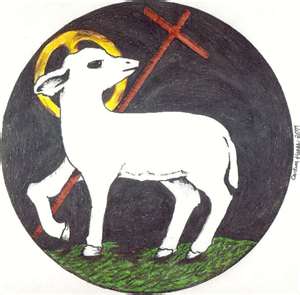
Today’s readings give us some biblical nicknames for Jesus.
In the first reading, Isaiah calls Him God’s Servant, and then proceeds to identify His mission. Through His Servant the Lord will show His glory, gather Israel back to Himself, and reveal His light to all the nations.
In the Gospel, John the Baptist dubs Jesus as the Lamb of God, and then he, too, goes on to describe the Savior’s mission. As the Lamb of God, Jesus will take away the sin of the world, baptize with the Holy Spirit and demonstrate that He is in fact God’s Chosen One.
In his Pelican commentary on this Gospel, John Marsh concludes that in this one word lamb, the evangelist had drawn together overtones of meaning from Old Testament prophecy, current Passover practices and the apocalyptic hopes of the times.
First, Old Testament prophecy. In Isaiah 53 the Servant is crushed for our sins and is led like a lamb to the slaughter. Nevertheless, because of his suffering he will take away the sins of many and win pardon for their offenses.
Second, current Passover practices. Every year the Jews re-enacted the Paschal story of Exodus 12. They slaughtered a year-old male lamb without blemish and sprinkled its blood on their doorposts. They then prayed that the Lord would pass over their homes as He destroyed their oppressors.
Third, the lamb in apocalyptic literature. In the book of Revelation the lamb is first slain as a victim for our redemption but then becomes a victorious conqueror who takes His seat upon God’s throne.
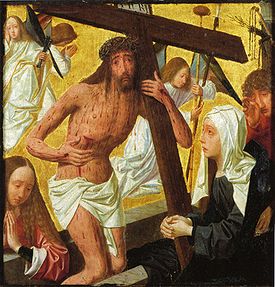
Now that we know where John the Baptist got his nickname for Jesus, so what? Let’s face it – the Lamb of God is not exactly a popular title suggesting strength, such as Richard the Lionhearted. But if we look more closely, we will see that the title Lamb of God does, in fact, stand for courage.
Although the Suffering Servant in Isaiah 53 went in silence to his sacrifice, he also went in strength and by his own choice. As followers of Jesus, can we take up our cross freely, with dignity, and in strength?
The paschal lamb was a means of liberation for God’s Chosen People from the oppression of Egypt. To be a disciple of the Lamb implies that we accept the challenges of liberation – whether from economic injustice or racial bigotry.
The Lamb of the Book of Revelation is a conquering Lamb – a Lamb who makes war on poverty and hunger, and who battles against immorality and corruption. We witness to the Lamb every time we fight for human rights, stand up for decency and protest incompetence in government.
The Lamb of God is more that a nickname. It is a challenge for us to keep on taking away the sins of the world so that it can truly be baptized with the Holy Spirit.
Source: Fr. Albert Cylwicki CSB, HIS WORD RESOUNDS, Makati, Philippines: St. Paul Publications, 1991, pages 45-47.



